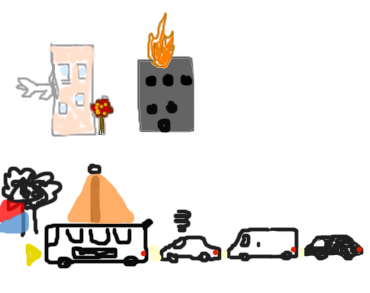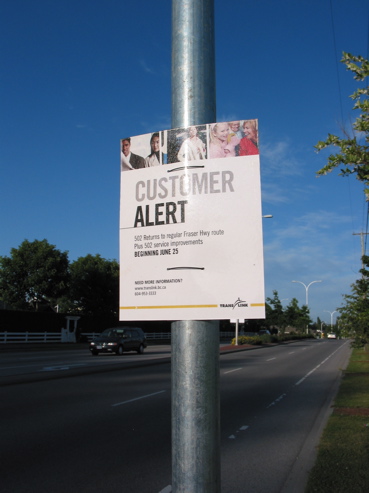A brief Monday lunch blog today highlighting some of the best arguments against Gateway so far. Via Beyond Robson.
Burnaby Mayor Derek Corrigan recently delivered an excellent speech to members of the public about opposition to the Province’s Gateway project. It is one of the most informative and compelling arguments to date. Congratulations on a moving and inspiring speech! Watch the YouTube video.
Corrigan said to visit Burnaby’s website for info.
Take public transit in Greater Vancouver often enough and you’ll know that for the most part, it’s pretty decent. Things tend to run smoothly on a daily basis and the SkyTrain lines are your best friend for fast, reliable service.
Except when it isn’t.

My friend referred to today as “freaky Friday.” A short morning SkyTrain delay — ironically, the day I get a ride to the SkyTrain I end up getting to work later — due to a problem train, a fire in the Downtown Eastside, and later on, two apparently simultaneous events: a small plane crash in Richmond and a gas leak in Surrey right across from King George Station, the last stop on the Expo Line.
Our on-the-ball “resident news correspondent” in the studio (P has Reuters as his home page) was shocked to find out someone else heard about the plane crash first. Unfortunately, no one knew about the apparent gas leak and, regardless of whether it’s a true claim, the resulting road closures that at rush hour put the busy area into a panic. It was 4:30 pm when it happened and an hour later I left work completely oblivious to the challenges that I was to face in getting home.
Continue reading Freaky Friday or, How to survive a transit breakdown »
Hopes of many including Port Moody Mayor Joe Trasolini are now dashed after rumours that Provincial Government funding toward rapid transit in the northeast sector were debunked via the Premier’s office.
According to the article in today’s Vancouver Sun, the only money coming is from the federal gas tax funds distributed to municipalities, that is to “pay for 200 new TransLink buses that use alternative-fuel technologies.” The expansion will also help meet capacity for high-volume routes.
The funding will go toward new buses that will “allow us to make significant improvements in bus service south of the Fraser,” said Suzanne Anton, TransLink director and Vancouver councillor. Most of these will be hybrid electric-diesels. Hopefully the bike racks won’t block the headlights on these ones.
The details on the fleet replacement and expansion (90 extra in service, basically) that will roll out by year’s end is old news. It’s not very comforting since every time TransLink makes “improvements” to bus service, something gets worse.
Campbell’s address at the Union of B.C. Municipalities annual meeting appears to have been all talk and regurgitation, with little concrete information or planning. The main topics were climate change and emissions reduction.
Continue reading Falcon thinks James has it backwards »

Update June 19: I’ve learned new information concerning the move of the 502 back to Fraser Hwy: it’s the City of Surrey’s decision. Residents are encouraged to file a complaint with the City. The following has been edited to change most occurences of “TransLink” to “the City,” indicated in bold.
Call it what you might, but I live here. I chose to live here (with some negotiating!), and as long as my commute may be, I pay a pretty low rent for a nice, big new space. Cloverdale — the little town in Surrey that could.
Well, it could until next week.
TransLink is rolling out yet more “improvements” to the 502 bus that runs from Surrey Central to the boonies (Aldergrove) and back. Yes, improvements: it will be every 15 minutes most of the time, if not more frequent (peak times), which rocks my socks. Unfortunately, their little footnote to their “improvements” message is thus: the 502 is moving back to Fraser Highway, as of Monday, June 25.
Continue reading TransLink City of Surrey ditches Cloverdalians »
I’m not talking about beefed-up wrestlers, unless Monster Trucks counts as a wrestling match.
Found this on Wired News (be sure to read the comments!). A truck that gets 7-8 miles per gallon in the city, and fills up at US $100. Yikes! Say hello to the 2007 Dodge Ram SRT10.
The NYTimes car reviewer says it best about the 2007 Dodge Ram SRT10: “This truck could be more politically incorrect only if it ran on whale oil and panda tears.”
Truly one of the great sentences in the history of auto journalism, by Ezra Dyer, in describing a 510 horsepower pickup that got between 7-8 miles per gallon during his test drive. Not at typo.
(Note the ironic typo there, and subsequent typos… oh well, spellchecking has yet to be sophisticated enough to get rid of some of mine, too!)
Read the full article here, extremely entertaining even for a girl who is completely disinterested in trucks. It’s just so well-written and witty!
Someone commented on the Wired post:
“I still cannot figure out how buying suv makes the price of gas go up. It seems that gas was cheap though the 70’s and car makers were building cars that got 7-8 mpg, not trucks mind you, cars… and it was most of them. I would imagine, if I had to guess that gas prices are increasing due to short supply, greedy oil companies, instability in the middle east, and the US’s refusal to build any new refineries. ”
Short supply thanks to gas-guzzling vehicles since the 70s, maybe? Hopefully not anymore, thanks to the Governator! Way to go, Arnold! Now, Mr. Bush, Mr. Harper, and Mr. Gordon Campbell…
The 3rd World Urban Forum just ended in Vancouver yesterday.
Bloggers may be interested in earthblog.ca, which is “a two-week discussion about the future of our region.” It runs until June 30.
(If you’re on a Mac, use Firefox as Safari is not entirely supported. Commenting doesn’t quite work in Safari.)
Description from their website:
“From June 15 to June 30, 2006, Earthblog features the daily writings of four opinionated bloggers, two provocative moderators, dozens of passionate community groups and thousands of local residents and visitors from around the world.
Earthblog.ca takes its inspiration from the 1976 UN Habitat Conference, an event that sparked discussion and debate on the state and form of cities. The occasion of the 30th anniversary of the UN Habitat Conference, the World Urban Forum, propels this discussion forward. Earthblog.ca is intended to provide a local perspective on the issues discussed at the WUF and includes themes brought to the fore by parallel events, such as the World Planners Congress, the World Peace Forum, EARTH: The World Urban Festival, and the World Youth Forum. Earthblog brings forward the perspectives of multiple voices on the social, cultural, environmental and economic issues that are relevant to the development of the region.”
I wish it were running indefinitely!
On their Sustainable Vision Wiki, I responded to this question:
Is “sustainability” anything more than just a buzz word?
My response:
“To sustain” has many relevant definitions. “Sustainability,” though tossed around until it seems like a fad, is a meaningful direction and goal for any city to prolong the health and lives of its citizens, infrastructure, economies, ecologies, etc. It is also about reducing a city’ and a city’s people’s ecological footprint, globally. Vancouver has an enormous global impact, and is never independent of the rest of the world for survival. Its ability to maintain itself with the least global impact, such as growing its own food and producing its own products with local materials, is what sustainability is all about.
i posted this just now at the Society for Community Development’s online forum. [link to post]
I recently read in the Vancouver Sun that the Gateway plans such as twinning the Port Mann and widening Hwy 1 have been cancelled (or something to that extent). now, they could at LEAST widen Hwy 1 south of the Port Mann by adding HOV lanes in both directions. wouldn’t that be smart? i don’t think it would draw more traffic into the city, which is what they’re concerned about. i think it would encourage perhaps less cars on the road because people would want to use the HOV lane, and it would relieve to some extent the horrible congestion that happens there. there is intense environmental damage and waste of money + gas that happens because of the traffic buildup at the south end of the port mann (northbound) all the way to… wherever it extends. i think, however, if adding an extra lane on at least one side of the highway will disrupt the other lanes during peak hours, it may be more trouble than it’s worth. but i think it’s worth considering… that and a skytrain line down the middle.
my dad was mentioning that it’s really about the trucks not the commuters, that they’re trying to open it up for trucks when those are the guys damaging the roads most and driving slowest (except for the occasional person going much slower than the speed limit). in the end the problems are too much growth in the city, too many cars, and too few options. i don’t mean too few roads.
translink has an incredible commitment to public transportation in the city and they’re seeing an increase in ridership. i live in cloverdale now, where it’s pretty good but it still takes a long time to get certain places that are not far away, and a long time to get to far away places thanks to 15 minute waits or infrequent service or long bus rides. i think while they’re paying attention to vancouver/south vancouver, coquitlam-pocomo, they’re forgetting the other end of the city that is expanding quite rapidly… surrey, langley, and beyond. i will never live in aldergrove so long as the bus goes there every hour… i guess there just isn’t the demand… so out there, out here, people drive cars. one day that’s going to snap back at them very badly. [edit: there is a commitment to development in surrey/white rock/langley but needed improvements may not be seen as soon as it is in other places, eg. 2009 RAV and Light Rail … moreover, there seems to be less talk and publicity about this area.]
people also don’t realise the true cost of driving. i’d like to find some kind of breakdown based on VANCOUVER’s price of gas, which is much higher than other cities, the costs of driving versus transit and other methods (walking, biking, even carpooling). i’d like to see it based on minimal driving, regular driving, and daily maximum driving.
the cost of an electric bike is about equivalent to a year’s INSURANCE alone. it has the convenience of a car: leave whenever you want. it can go places a car can’t, and it gives you great exercise. it costs less, is less stressful, and more enjoyable. how much can YOU cut down on driving in exchange for walking or riding a bike? can you do your grocery shopping more frequently with smaller loads and not take the car?


